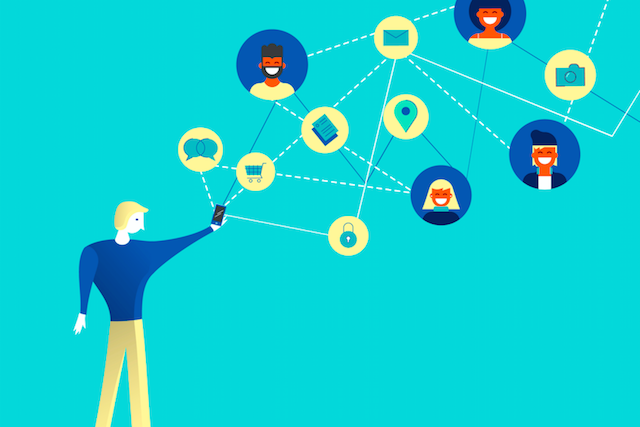
“The most important things in life are the connections you make with others.” ~Tom Ford
Three years ago I was living in the Bay Area, working for a start-up website as a community and content and manager. Every day, I signed online and wrote for hours about a topic that meant absolutely nothing to me.
I accepted the position because it was a dramatic pay increase from my previous temp and freelance lifestyle, and it afforded me my first solo apartment. I’d held dozens of different jobs in my time as I searched for meaningful work, and I certainly worked hard, but I always felt like I’d failed when it came to taking care of myself.
I simultaneously worked fifty-plus hour weeks to build my freelance resume and stockpiled ramen noodles, which felt disheartening to say the least. When I had a desk, a briefcase, and copious amounts of overtime where other people had a social life, I felt accomplished and important.
It wasn’t until the office closed and I began working from home that I realized how unfulfilled I felt.
I didn’t want to develop some calculated online persona to represent my company—I wanted to be my authentic self. I didn’t want to write about something that meant absolutely nothing to me for the sake of getting paid. And I didn’t want to engage with people superficially with an eye on Google Analytics.
If I signed onto a social networking site with a link to something I wrote, I wanted my heart to be in it. If I commented on someone else’s blog, I didn’t want it to be a thinly veiled attempt to drive traffic back to my employer’s site. I wanted my words and interactions to mean something more than that.
These past couple years building Tiny Buddha on Twitter, then here, and finally on Facebook, I’ve learned a lot about using the web in an authentic, purposeful way. Of course there’s still more to learn, but I’ve formed a few conclusions based on my experience thus far.
Whether you work online, you’re developing your own brand, or you only use the web recreationally, you may find these tips helpful in connecting meaningfully and authentically online.
How to Form Meaningful, Authentic Online Connections
The biggest obstacle to meaningful online connecting, I’ve found, is personal branding. Authenticity doesn’t have to mean complete transparency, but it does mean acknowledging what you really think and feel. Very rarely does a person think and feel only things that align with a polished online persona.
No one is a complete expert. No one has all the answers on any topic. No one is always happy and positive.
I’m by no means suggesting we should complain excessively or be insensitive or rude online. I’m merely suggesting that we recognize when we’re writing or portraying something that isn’t true to our actual experience, and then challenge that instinct.
This can be a little tricky because the reality is that personal branding is important if you’re establishing a business online. But it is possible to brand yourself while maintaining authenticity. To start:
1. Get comfortable saying, “I don’t know.”
When a customer walks into a store, they’d much rather hear, “I don’t know, but I’ll find someone who does” than waste their time with someone who’s too proud to ask for help. The same is true with online businesses and brands.
We trust people when they’re brave enough to acknowledge what they do and don’t know. You don’t need to feign omniscience to build authority. You just need to have a passion and commitment for what you do, backed up by consistency and hard work.
Go ahead and acknowledge your humanity. We connect and do business with humans, and all humans have room to grow.
2. Let yourself be vulnerable.
This is similar to acknowledging what you don’t know, but it encompasses more than that—it’s also about sharing what you actually think and feel.
Someone asked me recently what I do when I can’t answer the question, “How can I be inspiring today?” I told him it helps that I never ask myself that. I ask myself, “How can I be authentic today?”
If I’m feeling oversensitive, I write about dealing with criticism. If I’m feeling overwhelmed, I write about dealing with stress. And right within those posts, I acknowledge my own struggles.
Not everyone has an outlet in which this type of radical honesty feels appropriate, but we can all get a little more open when it comes to sharing what’s really on our minds.
At the end of the day, we’re all just people, and it’s our nature to want to really connect with each other—not with personas and brands, but with other real people who can relate to the universal struggles we all face. If we want to experience that with other people, we have to be willing to show them how it’s done.
3. Ask for what you really want.
Conventional wisdom suggests we should network, build relationships, give freely, and then await reciprocal action. In a way, this is smart advice. When you give without expectation, oftentimes your own needs get met, but this type of connecting often does entail expectation, albeit an unspoken one.
I’ve found it’s far more effective to simply be upfront with people. In the end, most of us really do want to help each other. In fact, of all the bloggers I’ve encountered online, the vast majority say that their purpose is to help people.
So be direct. If you’re looking for guidance or advice, ask for it. If you’d like someone to review your book, instead of asking if you can send it—no strings attached—ask outright if they’ll consider reviewing it. If you’re hoping to create some type of mutually beneficial arrangement with another blogger, put it out there upfront.
We don’t need to hide that we want to promote ourselves and earn money. Life requires us all to do that. We just need to find the courage to ask for what we need, and remember to be there for people who may need something from us.
4. Treat the web like an actual crowd.
At last year’s Wisdom 2.0 Conference, one of the speakers commented that his father wanted more Twitter followers. He reminded his dad that in real life, 200 people would be a huge crowd—why did he feel the need to speak to thousands of people online? If that were real life, he’d likely feel overwhelmed and nervous with such a massive audience.
Sometimes it seems like a completely different experience to share ourselves behind the safety of a computer—as if there aren’t really that many people listening and our words somehow have a different impact than when we can actually hear their echo.
One thing I try to do when I connect with people online is visual them standing in front of me. If I tweet something on my personal account, I visualize that I’m actually saying it to more than 11,000 people. If I’m writing an email or commenting on someone’s blog, I imagine they’re sitting in a chair next to me, looking right into my eyes.
When I think about someone looking at me and me seeing them, suddenly it feels a lot easier to peel away pretense and speak directly from my heart. In visualizing the other person or people as flesh-and-blood human beings, it feels a lot more natural to strip away my ego and simply be me.
—
I read the other day that most people spend the majority of their time online using social networking sites. We’re increasingly plugged in these days with cell phones and other gadgets, and more often than not that involves connecting with each other.
Connecting is a basic human need. Whether or not we make those relationships authentic and meaningful is entirely up to us.
About Lori Deschene
Lori Deschene is the founder of Tiny Buddha. She started the site after struggling with depression, bulimia, c-PTSD, and toxic shame so she could recycle her former pain into something useful and inspire others to do the same. You can find her books, including Tiny Buddha’s Gratitude Journal and Tiny Buddha’s Worry Journal, here and learn more about her eCourse, Recreate Your Life Story, if you’re ready to transform your life and become the person you want to be.
- Web |
- More Posts













 Though I run this site, it is not mine. It's ours. It's not about me. It's about us. Your stories and your wisdom are just as meaningful as mine.
Though I run this site, it is not mine. It's ours. It's not about me. It's about us. Your stories and your wisdom are just as meaningful as mine. 